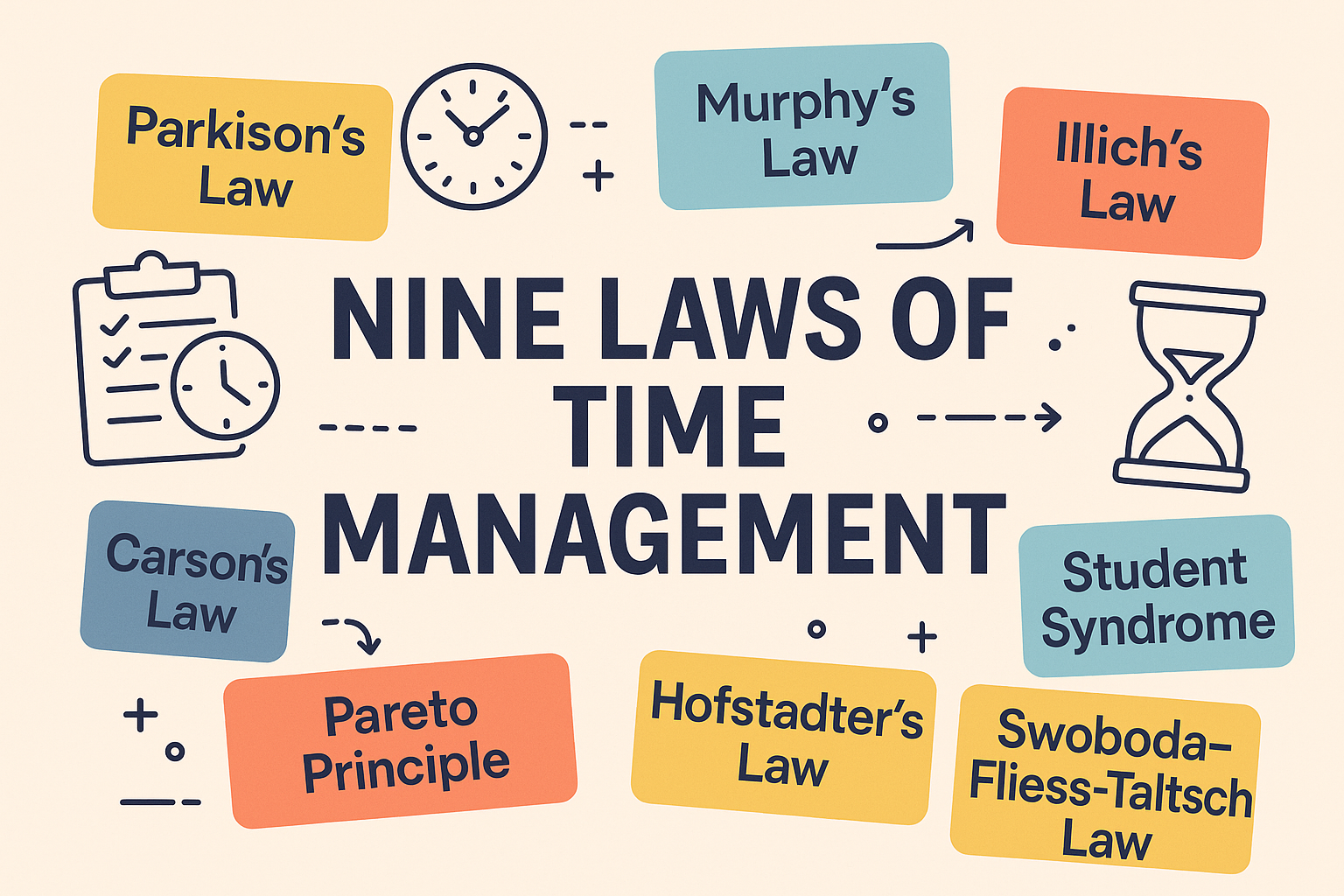Nine Laws That Shape Our Work and Time Management

In the world of work and time management, several principles and laws can greatly impact our efficiency and productivity. Here, we'll explore nine key laws: Parkinson's Law, Murphy's Law, Illich's Law, Carson's Law, Fraisse's Law, the Pareto Principle, Hofstadter's Law, Student Syndrome, and the Swoboda-Fliess-Teltscher Law. Understanding these laws can help us better manage our time and expectations.
1. Parkinson's Law: "Work Expands to Fill the Time Available"
Parkinson's Law suggests that the more time we have to complete a task, the longer it will take. If you give yourself a week to complete a two-hour task, it will take a week. To combat this, set tighter deadlines and create a sense of urgency to boost productivity.
2. Murphy's Law: "Anything That Can Go Wrong Will Take Longer Than You Expect"
Murphy's Law reminds us that unexpected problems can arise and delay our progress. Even with careful planning, things can go wrong. To mitigate this, build in buffer time for unforeseen issues and always have a contingency plan.
3. Illich's Law: "Beyond a Certain Threshold of Work, Efficiency Declines"
Illich's Law states that after a certain number of work hours, our efficiency starts to drop. Overworking can lead to burnout and decreased productivity. It's essential to take regular breaks and avoid excessive overtime to maintain high efficiency.
4. Carson's Law: "Doing a Task Continuously Takes Less Time Than Doing It in Several Phases"
Carson's Law highlights the benefits of focused, uninterrupted work. Breaking a task into multiple phases can lead to inefficiencies due to the need to repeatedly start and stop. Try to complete tasks in one continuous session whenever possible.
5. Fraisse's Law: "One Hour Is Not Equal to One Hour"
Fraisse's Law deals with the subjective perception of time. An hour spent doing something enjoyable can feel much shorter than an hour spent on a tedious task. Being aware of this can help us manage our time better by alternating between different types of tasks to maintain engagement.
6. The Pareto Principle (80/20 Rule): "20% of Our Activities Produce 80% of Our Results"
The Pareto Principle, or the 80/20 Rule, suggests that a small portion of our activities (20%) are responsible for the majority of our results (80%). Identifying and focusing on these high-impact activities can significantly improve productivity.
7. Hofstadter's Law: "It Always Takes Longer Than You Expect, Even When You Take into Account Hofstadter's Law"
Hofstadter's Law emphasizes that tasks often take longer than anticipated, even when we consider potential delays. This law encourages us to be realistic and generous with our time estimates to avoid constant underestimation.
8. Student Syndrome: "People Start to Fully Apply Themselves to a Task Just Before a Deadline"
Student Syndrome refers to the tendency to procrastinate until a deadline is imminent, leading to a last-minute rush to complete the task. To avoid this, set interim deadlines and milestones to ensure steady progress throughout the project timeline.
9. Swoboda-Fliess-Teltscher Law (Biorhythm Theory): "Human Efficiency and Productivity Vary According to Biological Cycles"
The Swoboda-Fliess-Teltscher Law, or Biorhythm Theory, suggests that our productivity and efficiency fluctuate according to biological cycles. Being aware of these cycles can help us schedule tasks during peak performance times and rest during low phases.
Wrap-up
Conclusion
Understanding these laws can greatly enhance our time management and productivity strategies. By recognizing and addressing the challenges posed by each law, we can create more realistic plans, improve efficiency, and ultimately achieve better results in our work and personal lives.

Dimitri Missoh | 2024-05-31